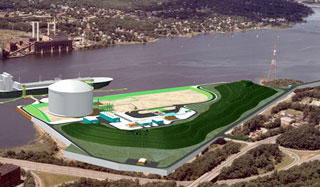MASSACHUSETTS SPOTLIGHT
No Lack of Sparks in Energy Sector
Energy is much on the minds of Massachusetts residents, companies and venture capitalists these days. Sometimes it takes the form of visionary project news like a possible ocean energy research center off the coast, or Nuvera Fuel Cells' plans to create 250 jobs and double its footprint with a relocation to Billerica from Cambridge, accompanied by a $15- million investment in the purchased facility. Mass Development approved a 7- year, $5.75 million loan for the project, consisting of a $2.5- million Emerging Technology Fund (ETF) loan and a funding commitment of $3.25 million from the Massachusetts Technology Collaborative.
At other times, some energy project backers might wish they could package the energy devoted to spirited debate of their projects.
 |
| The proposed Weaver's Cove LNG terminal in Fall River still faces stiff opposition, including from Massachusetts Gov. Mitt Romney. But the project continues to move forward with federal and state certifications, and now, like the state's wind projects, is working with the U.S. Coast Guard on further analysis of navigation issues. |
Last fall, Rep. Joe Barton (R- Texas), chairman of the House Energy and Commerce Committee, noted during hearings that the Weaver's Cove project "showcases the lengths opponents will go to stop a project. After FERC approved the application, the opponents slipped a provision in the highway bill (HR 3) to prevent the demolition of the Brightman Street Bridge in order to block LNG tankers from using the river to get to the Weaver's Cove project.
"Increasingly," Barton continued, mentioning several stalled projects in the region, "the energy policy of some states and cities in the chilly Northeast seems to be 'let them freeze in the dark.' "
Paul Afonso has 20 years of energy, legislative and regulatory experience and a strong background in international trade law, including service as chairman of the Massachusetts Department of Telecommunications and Energy (DTE) from 2003 to 2005, and as a DTE commissioner until joining Brown Rudnick in June 2006. He says the Commonwealth's R&D prowess and the energy sector can be part of the integrated economic development strategy for the state. Even though the area's energy costs may be comparatively high in the typical industrial development site selection matrix, producing the technology for that energy- producing sector plays into Massachusetts' R&D strengths.
As proof, Afonso indicates the high level of interest in the renewable energy sector he's witnessed from the wealth of prestigious venture capital firms along Boston's famous Route 128 corridor, who all want to link up to the regulatory sphere at the state and federal levels.
As for the concrete projects now before the populace, Afonso has been in the thick of the crossfire, starting with the Weaver's Cove proposal, first submitted in 2003. The LNG terminal would be constructed adjacent to an existing LNG plant that has operated in Fall River since 1970.
"It's clear, if you look at the facility we already have, if we were to design that today, it would be hard to build it," says Afonso, a leader in the region's Portuguese community with close ties to people in both Fall River and Gloucester, where offshore LNG proposals are afoot. "But the fact that that facility is there, when it comes to peak days in the Commonwealth, that's an absolute necessity; We've done the analysis, and that facility is integral to keeping the lights on."
The Weaver's Cove project has been opposed by Romney and other area governors because of safety concerns. But FERC recently refused a rehearing of opponents' objections, and the project is moving forward as well as it can in the agency thicket.
Jim Grasso, spokesman for Weaver's Cove Energy, says, "We are on schedule. We have received our FERC certificate three times. We just received last week a MEPA certificate, and we continue to work with the Coast Guard making sure we follow all their rules and regulations, as we are doing with the 27 other federal, state and local regulatory agencies."

